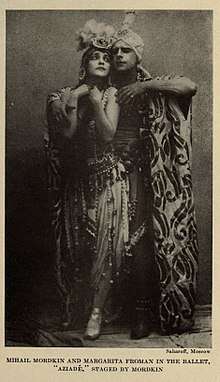Margarita Froman
Margareta Petrovna Froman (8 November 1890 – 24 March 1970), known professionally as Margarita Froman, was a Russian ballet dancer, dance educator, and choreographer. (Sources vary on her birthdate; some give a year as late as 1896.)[1]
Margarita Froman | |
|---|---|
 Margarita Froman and Mikhail Mordkin, from a 1922 publication. | |
| Born | 8 November 1890 Moscow |
| Died | 24 March 1970 Boston |
Early life
Margareta Petrovna Froman was born in Moscow, the daughter of a Swedish father and a Russian mother.[2] She began her dance studies at the Imperial School of Ballet.[3]
Career
Froman was a soloist at the Bolshoi Theatre in Moscow as a young woman. She toured Europe and the United States with Diaghilev's Ballets Russes.[4] She appeared in an early Russian silent film, dancing in Aziade (1918) with Mikhail Mordkin.[5]
In 1917 she moved to Yugoslavia with her brothers Maximilian, Pavel, and Valentin, who all also worked in the dance profession.[6][7] She was ballet mistress at the Croatian National Theatre, and choreographer at the Zagreb Opera Ballet, and the State Opera Ballet in Belgrade. In 1938 she choreographed and produced several shows in Milan, at La Scala. She retired from performing in 1947.[8] She created choreography for the film Zastava (1949). In 1955 she choreographed the Yugoslav National Opera and Ballet's London productions of Prince Igor, Romeo and Juliet, The Devil in the Village, Ero the Joker and The Gingerbread Heart.[9]
Froman moved to the United States in 1957, and taught with her brother Maximilian at the Froman Professional School of Ballet in New London, Connecticut.[4] She also taught at the Hartford Conservatory and the University of Connecticut.[1][2]
One of her noted students was Mia Slavenska.[7]
Personal life
Margarita Froman lived in Willimantic, Connecticut for her last 13 years. She died in 1970, aged 80 years, in Boston.[10] Her papers were donated to the University of Connecticut by her sister, Olga.[1][11] Her grave is in the Russian Orthodox Cemetery in Willimantic.[8]
References
- "Collection: Margarita Froman Papers". UConn Archives & Special Collections. Retrieved 2020-04-23.
- Linderman, Isabel (1959-09-20). "Famed Russian Ballerina Joins Local Faculty". Hartford Courant. p. 126. Retrieved 2020-04-23 – via Newspapers.com.
- "Margarita Froman". Oxford Reference. doi:10.1093/oi/authority.20110803095836382. Retrieved 2020-04-23.
- Linderman, Isabel (1959-09-20). "Famed Russian Ballerina Joins Local Faculty (continued)". Hartford Courant. p. 127. Retrieved 2020-04-23 – via Newspapers.com.
- "Romanov Twilight: Early Russian Cinema". BAMPFA. Retrieved 2020-04-23.
- Cohen, Selma Jeanne; Foundation, Dance Perspectives (1998). International encyclopedia of dance: a project of Dance Perspectives Foundation, Inc. Oxford University Press. p. 431. ISBN 978-0-19-512310-4.
- Meylac, Michael (2017-10-30). Behind the Scenes at the Ballets Russes: Stories from a Silver Age. Bloomsbury Publishing. pp. 135, 182. ISBN 978-1-78673-205-7.
- "Margarita Froman Dies; Prima Ballerina, Teacher". Hartford Courant. 1970-03-25. p. 4. Retrieved 2020-04-23 – via Newspapers.com.
- Wearing, J. P. (2014-09-16). The London Stage 1950-1959: A Calendar of Productions, Performers, and Personnel. Rowman & Littlefield. pp. 354–356. ISBN 978-0-8108-9308-5.
- "Obituary for MARGARITA FROMAN". The Californian. 1970-03-26. p. 26. Retrieved 2020-04-23 – via Newspapers.com.
- "Ballerina Mementoes Donated". The Spokesman-Review. 1971-04-18. p. 78. Retrieved 2020-04-23 – via Newspapers.com.